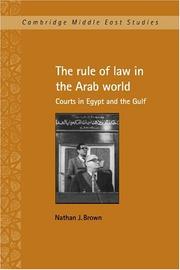| Listing 1 - 1 of 1 |
Sort by
|

ISBN: 0521590264 0521030684 0511583273 0511002734 9780521590266 9780511002731 9780511583278 9780521030687 Year: 1997 Volume: 6 Publisher: Cambridge : Cambridge University Press,
Abstract | Keywords | Export | Availability | Bookmark
 Loading...
Loading...Choose an application
- Reference Manager
- EndNote
- RefWorks (Direct export to RefWorks)
Nathan Brown's penetrating account of the development and operation of the courts in the Arab world is based on fieldwork in Egypt and the Gulf. The book addresses several important questions. Why, for example, did Egypt's political leaders construct an independent judicial system that limited their own authority? And why does such a system appeal to Arab rulers outside Egypt? While most accounts stress the role of imperialism or liberal ideology, the author maintains that the primary purpose of the system is to provide support for the officially sanctioned order. The model offers similar attractions for other Arab rulers. From the theoretical perspective, the book will contribute to the debates about liberal legality, political change and the relationship between law and society in the developing world. It will be read by scholars of the Middle East, law students and those interested in the history of law and its evolution.
Courts --- Rule of law --- Tribunaux --- Règle de droit --- -Courts --- -Rule of law --- -Supremacy of law --- Administrative law --- Constitutional law --- Judiciary --- Dispute resolution (Law) --- Judicial districts --- Law --- Procedure (Law) --- Judicial power --- Jurisdiction --- Justice, Administration of --- Law and legislation --- Règle de droit --- Supremacy of law --- Arab countries --- Egypt --- Persian Gulf States --- Courts - Arab countries. --- Courts - Egypt. --- Courts - Persian Gulf States. --- Rule of law - Arab countries. --- Rule of law - Egypt. --- Rule of law - Persian Gulf States. --- General and Others --- Courts - Arab countries --- Courts - Egypt --- Courts - Persian Gulf States --- Rule of law - Arab countries --- Rule of law - Egypt --- Rule of law - Persian Gulf States
| Listing 1 - 1 of 1 |
Sort by
|

 Search
Search Feedback
Feedback About UniCat
About UniCat  Help
Help News
News